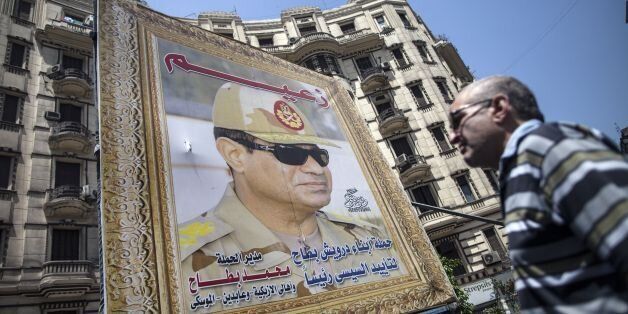CAIRO — A sense of celebration permeated the scene outside many polling stations here on Monday. People lining up to cast ballots for yet another president chanted and sang songs in support of former military chief Abdel-Fattah el-Sissi, as military helicopters hovered low in the sky and heavily-armed masked soldiers guarded the lines.
El-Sissi, who has been leading the country since ousting democratically elected Islamist President Mohammed Morsi last July, is expected to win the two-day elections in a landslide. But many people here are boycotting the election entirely or expressing deep apathy for a vote they say is all too predictable. In addition to fierce Morsi supporters, many secular Egyptians also say they’ve lost faith in the ballot box.
“I just don’t see why I should bother,” said Dalia Shoukry, a 29-year-old who protested during the 2011 revolution to topple longtime dictator Hosni Mubarak. “[The state is] puppeteering everything and making it seem like it’s a democracy. Everyone is believing it.”
While Shoukry is no supporter of Morsi — she is quick to slam his rule as entirely ineffective — she said she has no tolerance for el-Sissi, who many say will become the country’s next dictator. It’s exactly the kind of leadership she demonstrated against in Tahrir Square more than three years ago.
Shoukry’s husband, a 31-year-old doctor named Mohamed Wahhaby, said that most of his friends are choosing not to vote. “We need a whole restructuring of the government hierarchy,” he said. “El-Sissi got handed the country on a silver platter.”
Since Morsi’s ousting last summer, tens of thousands of people — including journalists, academics and high-powered revolutionary activists — have been sent to jail and thousands have been killed. The very act of protesting is now illegal without a permit from the government. But el-Sissi’s large support base says that a strict rule of law is exactly what Egypt needs to fix the crumbling economy and energy crisis and curb the near-daily attacks on security buildings and personnel.
El-Sissi did not appear at any of his official rallies leading up to the election. But posters and banners bearing his face are plastered all over the capital city. El-Sissi mugs, hats, pins, flags and chocolates are sold everywhere, whereas paraphernalia for his leftist opponent, Hamdeen Sabahi, is few and far between.
Still, many feel the country is just backtracking to the type of leadership that helped spark the Arab Spring. Activist Ahmad Badawy, who works at the Egyptian Democratic Academy, a Cairo-based NGO, said el-Sissi resembles nothing short of a fascist ruler. When Egyptians went to the polls in January in a constitutional referendum supported by the military-backed government, Badawy was arrested and beaten for passing out fliers urging Egyptians to vote ‘no.’ He said he has no interest in voting this week.
“I don’t see any elections; I only see the crowning of a new dictator,” he said. Even if he wanted to vote, he added, his Egyptian ID was taken during his detainment and he hasn’t been able to get a new one yet.
Egypt’s media has largely taken a nationalistic tone in portraying el-Sissi as Egypt’s savior. Newspaper columns have poeticized his masculinity and television stations have branded election boycotters as traitors.
“He’s a father figure, a savior, a knight in shining armor,” a woman named Sara, who works in the development sector, remarked sarcastically. She agreed to speak about her decision to boycott the election, but declined to give her last name out of fear for her security. “El-Sissi doesn’t need to explain his position on issues. People worship him. It’s not going to make a difference if I vote.”
Instead, Sara said she is putting her energy toward making a difference after the election, getting involved with grassroots campaigns to try to change the country’s long-entrenched oppression.
People should not be “focused on a magic bullet or just one person who will make everything better,” she said. “There is a need for security, but that is precisely the problem with the last 30 or more years. There was always this prioritization over people’s rights. We haven’t learned that lesson yet.”





